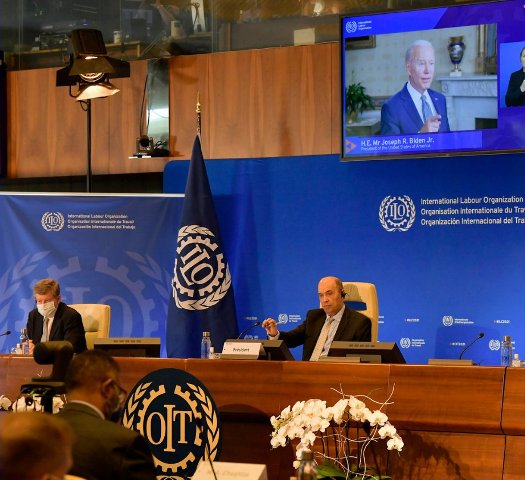Global Call to Action for human-centred COVID-19 recovery adopted
The second set of actions covers international cooperation and the role of multilateral institutions, including the ILO, with the aim of increasing the level and coherence of their support for national “human-centred” pandemic recovery strategies.

Delegates from 181 countries representing the Governments, workers and employers at the International Labour Conference (ILC) have adopted unanimously a Global Call to Action for a human-centred COVID-19 recovery that prioritizes the creation of decent jobs for all and addresses the inequalities caused by the crisis.
The Global Call to Action for a Human-Centred Recovery outlines a comprehensive agenda. It commits countries to ensure that their economic and social recovery from the crisis is “fully inclusive, sustainable and resilient.”
The agreement includes two sets of agreed actions. The first covers measures to be taken by national governments and their employer and trade union ‘social partners’, to achieve a job-rich recovery that substantially strengthens worker and social protections and supports sustainable enterprises.
The second set of actions covers international cooperation and the role of multilateral institutions, including the ILO, with the aim of increasing the level and coherence of their support for national “human-centred” pandemic recovery strategies.
It calls on the ILO – with its mandate for social justice and decent work – to play a leadership role and use all means of action to support the design and implementation of recovery strategies that leave no one behind, including by reinforcing cooperation with other institutions of the multilateral system.
The Call to Action is grounded in the ILO’s Centenary Declaration for the Future of Work, adopted at the 2019 ILC. The Call provides a path for accelerating the practical implementation of the Declaration through enhanced policies and investment that support a broad-based, fully inclusive recovery. It also calls for urgent, coordinated action in related areas, including international cooperation and solidarity to ensure global and equal access to vaccines, treatments and preventive measures.
ILO Director-General Guy Ryder welcomed the agreement: “Creating a recovery that is inclusive, sustainable and resilient must become a top priority for public policy. This resolution provides a clear and comprehensive way forward that will enable countries to convert the moral and political aspiration of leaving no one behind into concrete action.”
He added: “The effectiveness and resilience of the recovery from COVID-19 will depend heavily on how broadly-based and socially inclusive it is. Unless we specifically address the inequalities that have deepened during this crisis there is a very real risk that the economic and social consequences will cause long-term scarring, particularly for disproportionately affected groups such as young people and women, and the small and microenterprises that provide most of the world’s employment.”
In a special sitting of the ILC, prior to adopting the Call to Action, delegates took part in the first day of the two-day World of Work Summit: Global action for a human-centred COVID-19 response. The Summit discussed the effects of the COVID-19 pandemic on labour markets, and recovery strategies that promote social justice and decent work.
The Summit also heard video messages from key world leaders, including Pope Francis; South Korean President, Moon Jae-in; Portuguese Prime Minister, António Costa and US President Joe Biden.
- READ MORE ON:
- COVID-19
- International Labour Conference
- ILO










